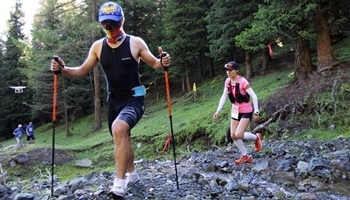DURBAN, July 18 (Xinhua) -- Doctors Without Borders (MSF) on Monday called for greater efforts to develop and implement an action plan to address the critical lack of access to HIV treatment in West and Central Africa where coverage remains below 30 percent.
The call was made at the ongoing 21st International AIDS Conference taking place in Durban.
While significant progress has been made in South Africa since the first Durban conference in 2000, deadly and unnecessary HIV treatment gaps persist in other countries, MSF said.
Adopting community-based strategies could help expand coverage in West and Central Africa where barely one in four people among the 6.5 million with HIV in the region have access to treatment, according to MSF.
Nearly one third of AIDS-related deaths globally occur in the region, and in order to achieve the global goal of reaching 30 million people with treatment by 2020, agreed by all governments at the UN in June, an additional 13 million people need to be reached with treatment, one third of whom live in West and Central Africa.
New MSF data from Southern Africa suggests that the implementation of "Test and Start" is feasible but that community-led outreach is necessary to test and link people living with HIV to care and support them on lifelong treatment.
This situation in several countries in West and Central Africa is reminiscent of MSF's call at Durban 2000 to expand access to affordable antiretroviral drugs in South Africa, where more people than ever are now living long and healthy lives on treatment.
"As we've seen, civil and community support and affordable medications play a key role in making sure people get and stay on antiretroviral therapies. Failing to reach people in neglected regions puts at risk global goals to reach 30 million people with treatment by 2020 and achieve UNAIDS 90-90-90 targets," MSF said.
The HIV situation in West and Central Africa reminds us of the terrible days over a decade ago in Southern Africa, when people were dying and no treatment was available.
"Solutions to close this massive treatment gap exist; we need a massive booster shot for West and Central African if we're going to get anywhere close to achieving the global treatment goals," said Dr. Eric Goemaere, HIV/TB Unit Coordinator for MSF's Southern Africa Medical Unit.
When there are so many millions of people on treatment today, the right to access that lifesaving treatment should not depend on where people live, he said.
"We cannot leave these people behind,"he stressed.










